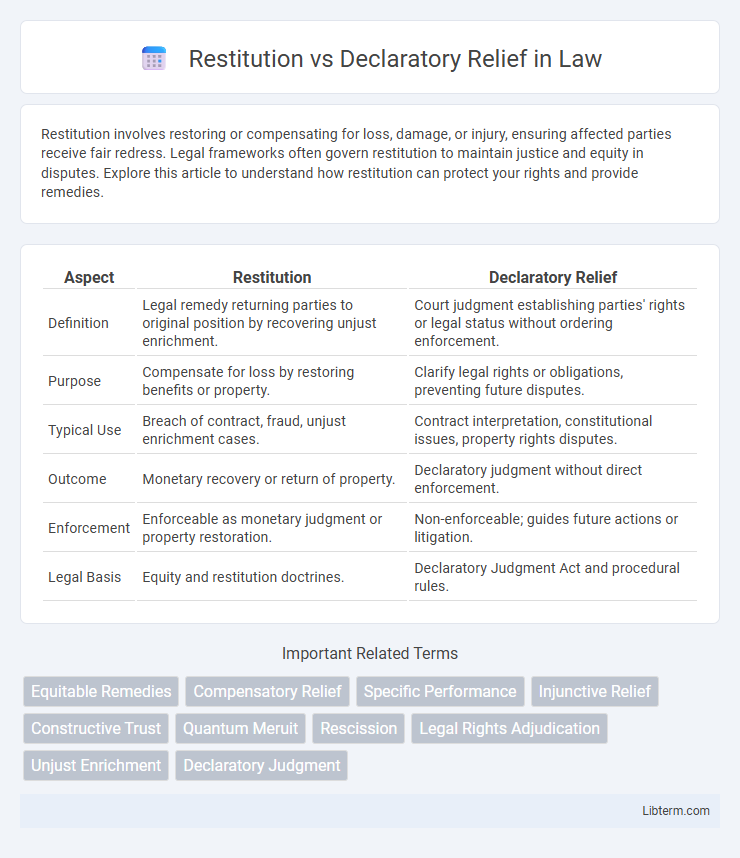Restitution involves restoring or compensating for loss, damage, or injury, ensuring affected parties receive fair redress. Legal frameworks often govern restitution to maintain justice and equity in disputes. Explore this article to understand how restitution can protect your rights and provide remedies.
Table of Comparison
| Aspect | Restitution | Declaratory Relief |
|---|---|---|
| Definition | Legal remedy returning parties to original position by recovering unjust enrichment. | Court judgment establishing parties' rights or legal status without ordering enforcement. |
| Purpose | Compensate for loss by restoring benefits or property. | Clarify legal rights or obligations, preventing future disputes. |
| Typical Use | Breach of contract, fraud, unjust enrichment cases. | Contract interpretation, constitutional issues, property rights disputes. |
| Outcome | Monetary recovery or return of property. | Declaratory judgment without direct enforcement. |
| Enforcement | Enforceable as monetary judgment or property restoration. | Non-enforceable; guides future actions or litigation. |
| Legal Basis | Equity and restitution doctrines. | Declaratory Judgment Act and procedural rules. |
Understanding Restitution: Definition and Key Concepts
Restitution involves restoring a party to their original position by returning unjustly obtained benefits, aiming to prevent enrichment at another's expense. Key concepts include disgorgement of profits, compensation for loss, and equitable remedies that focus on fairness rather than punishment. Unlike declaratory relief, which establishes legal rights without enforcing actions, restitution mandates tangible restitution of value or assets.
What Is Declaratory Relief? An Overview
Declaratory relief is a legal remedy that establishes the rights, duties, or obligations of parties without ordering any specific action or awarding damages. It is commonly used to clarify legal uncertainties, prevent further litigation, and resolve disputes by providing a binding judicial declaration. Unlike restitution, which focuses on restoring a party to their original position, declaratory relief aims to define legal relationships and guide future conduct.
Legal Foundations: Statutory and Common Law Origins
Restitution is grounded in both statutory law and common law principles aimed at preventing unjust enrichment by requiring parties to return benefits wrongfully obtained. Declaratory relief originates primarily from equity jurisdiction and statutory provisions allowing courts to define parties' rights without ordering specific action or damages. Legal foundations of restitution emphasize compensatory remedies, whereas declaratory relief focuses on clarifying legal relationships and obligations.
Purpose and Objectives of Restitution
Restitution aims to restore the injured party to the position they occupied before the unjust enrichment or wrongful act occurred, focusing on returning specific benefits or monetary value obtained unfairly. Its primary objective is to prevent one party from profiting at another's expense by recovering actual losses or gains made through improper conduct. In contrast, declaratory relief seeks to establish the legal rights and obligations between parties without enforcing a specific action or awarding damages.
Purpose and Objectives of Declaratory Relief
Declaratory relief aims to establish the legal rights and obligations of parties without ordering any specific action or awarding damages, providing clarity and preventing future disputes. Its primary objective is to resolve uncertainties by obtaining a judicial declaration on the status or interpretation of a legal matter. Unlike restitution, which seeks to restore a party to a previous position by returning unjust gains, declaratory relief focuses on affirming legal relationships or rights proactively.
Key Differences Between Restitution and Declaratory Relief
Restitution involves restoring a party to the position they were in before a loss, often through monetary compensation for unjust enrichment or breach of contract. Declaratory relief, on the other hand, provides a court judgment that clarifies the legal rights or obligations of parties without awarding damages or enforcing action. Key differences include restitution's focus on compensation for past harm, whereas declaratory relief addresses legal status or relationships to guide future conduct.
When to Seek Restitution in Legal Disputes
Restitution is appropriate in legal disputes when a party has been unjustly enriched at the expense of another and the goal is to restore the injured party to their original position by recovering specific funds or property. It is commonly sought in breach of contract, fraud, or property cases where monetary compensation corresponds directly to the loss suffered. Declaratory relief is preferred when parties seek a court's determination of their rights or obligations without immediate monetary recovery, focusing on clarifying legal relationships rather than imposing financial remedies.
Appropriate Use Cases for Declaratory Relief
Declaratory relief is appropriately used when parties seek a court's determination of their rights, obligations, or legal status without requiring an order for enforcement or compensation. It is ideal in cases involving interpretation of contracts, insurance coverage disputes, or questions about the legality of government actions, providing clarity and preventing future litigation. This form of relief helps parties avoid uncertainty by obtaining a definitive judicial declaration rather than monetary restitution or coercive remedies.
Court Procedures: Filing and Proving Each Remedy
Filing for restitution requires the plaintiff to submit a detailed account of losses and demonstrate a direct causal link between the defendant's actions and the financial harm incurred. Declaratory relief demands the plaintiff establish a justiciable controversy and prove entitlement to a court declaration that defines legal rights or obligations without necessarily seeking monetary compensation. Courts scrutinize evidence of actual loss and unjust enrichment in restitution cases, while declaratory relief hinges on interpretation of legal rights and the existence of an active dispute.
Restitution vs Declaratory Relief: Choosing the Right Legal Remedy
Restitution involves returning or compensating for unjust enrichment, aiming to restore the injured party to their original position, while declaratory relief seeks a court's formal determination of the parties' rights or legal relationship without ordering any specific action or damages. Choosing between restitution and declaratory relief depends on the case context; restitution is appropriate where monetary or property recovery is necessary, whereas declaratory relief is best when resolving legal uncertainties or disputes over rights. Courts often consider the remedy's effectiveness in addressing the plaintiff's goals, the availability of damages, and the clarity needed in legal interpretations.
Restitution Infographic

 libterm.com
libterm.com